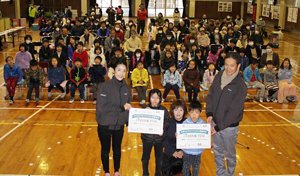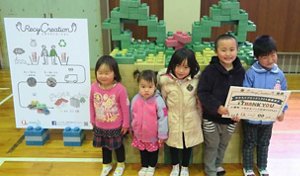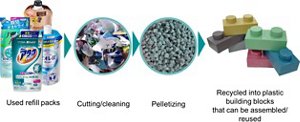Kao's RecyCreation Project Gives Back in Kamikatsu, Japan
Changing the Common Practice of Throwing It Away after Use
Kao Corporation is offering new systems and fun and creative experiences for consumers through RecyCreation*1 to create circularity in society. One specific project is working with local communities and partner companies to collect used detergent, shampoo, and other refill packs, and then processing them into recycled resin for other uses.
In the town of Kamikatsu, Tokushima Prefecture, Japan, Kao has been collecting used film type refill packs since 2016. A total of 350 kilograms of recycled resin has been created from used packs collected in Kamikatsu over three years. This recycled resin was then turned into blocks named "Okaeri-blocks.*2 " A ceremony to give the blocks to Kamikatsu was held at Kamikatsu Elementary School on January 26.
-
* 1 A combination of the words recycle and creation, RecyCreation upcycles items through fun experiences to create new value, rather than recycling materials for the purpose of reproducing the same types of materials, with the goal of changing the habit of "use and throw away."
-
* 2 In Japanese, okaeri means "welcome back," and is the greeting a family member or loved one receives when they come back home. The name "Okaeri-block" conveys Kao's desire to give back to society and the local community the good intentions of everyone who helped collect the used packs.


Ceremony to hand over the Okaeri-blocks in Kamikatsu, Japan
Kao Corporation released the "Kao Environmental Statement" in 2009, in which the company states its commitment to reduce its environmental impact at every level of business activities, to promote environmental conservation, and to build a sustainable society. In reducing the environmental footprint caused by product packaging, Kao takes the "4R approach," with "reduce" as its base principle and adding "replace," with the objective of switching raw materials to more sustainable choices, to "reuse" and "recycle."
Using the new approach of RecyCreation since 2015, Kao has undertaken research to establish a new resource circulation system for packaging and has started projects to validate its value together with local communities and partner companies.
Kao will continue to create new possibilities for RecyCreation, extending the circle of co-creation while building trust and support with various communities and stakeholders.

RecyCreation in Kamikatsu
In 2003, the town of Kamikatsu released the first-ever Zero Waste Declaration in Japan, deciding to eliminate waste in Kamikatsu by 2020 to pass down to future generations of children clean air, water, and land. Waste in the town is strictly sorted before being disposed, and the zero-waste initiative has attracted worldwide attention.
In support of Kamikatsu's policy and the thinking behind it, Kao proposed partnering together on RecyCreation activities, which began in 2016. These activities are led by Zero Waste Academy, a specified nonprofit corporation, with backing from the Kamikatsu town office. Zero Waste Academy engages in 3R (reduce, reuse, recycle) activities together with community residents and the local government based on Kamikatsu's zero-waste philosophy. It also provides training to raise people's environmental awareness, engages in zero-waste product development, conducts surveys and research for projects, and works to create partners with the same goals around the world. Akira Sakano, the chair of its Board of Directors, served as co-chair of the World Economic Forum Annual Meeting (Davos 2019) held from January 22 to 25.
Refill pack collection is done together with partner companies with the support of community residents. A collection box for refill packs is set up in the town's sole waste station used by all town residents to sort and dispose of waste.
About Kao
Kao creates high-value-added products that enrich the lives of consumers around the world. Through its portfolio of over 20 leading brands such as Attack, Bioré, Goldwell, Jergens, John Frieda, Kanebo, Laurier, Merries and Molton Brown, Kao is part of the everyday lives of people in Asia, Oceania, North America and Europe. Combined with its chemical division, which contributes to a wide range of industries, Kao generates about 1,500 billion yen in annual sales. Kao employs about 33,000 people worldwide and has 130 years of history in innovation. Please visit the Kao Group website for updated information.
Media inquiries should be directed to:
Corporate Communications
Kao Corporation
